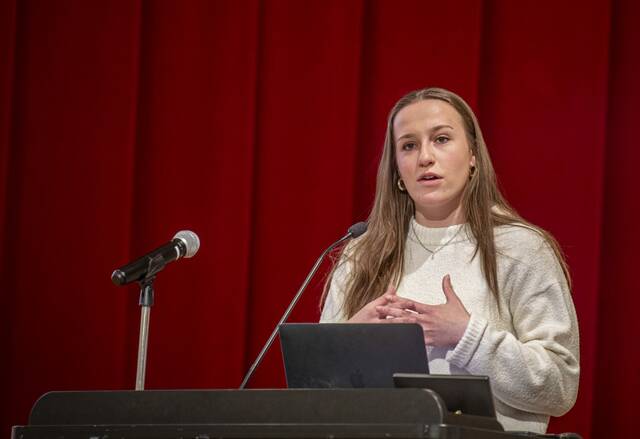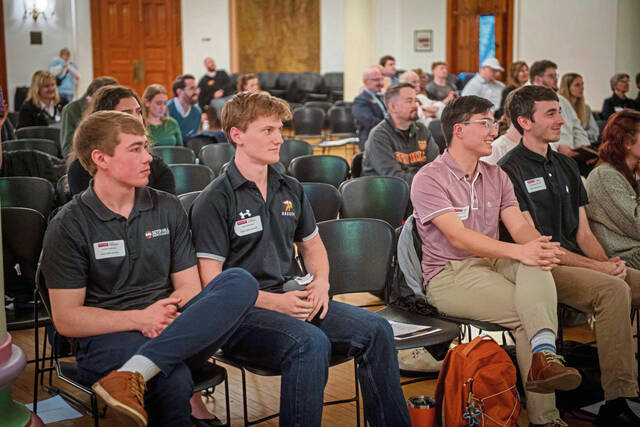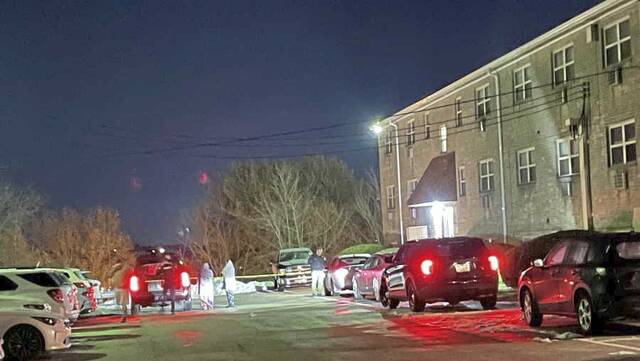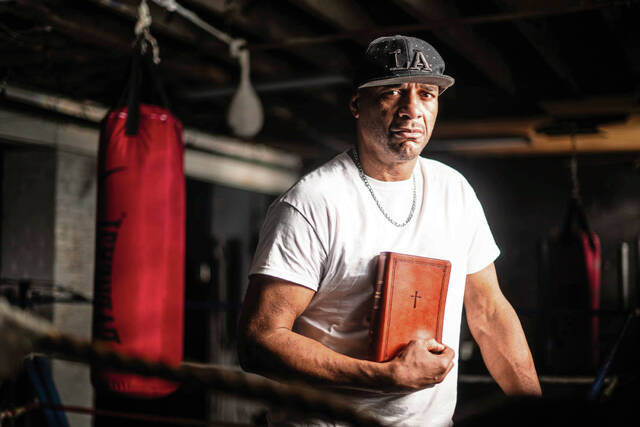Seton Hill student Nora Ozimek knew in high school she wanted to pursue a career in science.
But even Ozimek, a junior studying biology and chemistry, admits that reading through research papers and journal articles is not her favorite task.
The aspiring research and development scientist was one of a dozen Seton Hill students to participate in the Griffin Impact Challenge on Thursday evening — a “Shark Tank”-style event where participants pitched business ideas, solutions and initiatives to launch at the university, in Greensburg or another community of importance to them.
“Science is very important,” Ozimek said, “but it’s not always the easiest to share. We often see science in the form of these big research posters that are dense. And you really don’t even stop to take the time to read them, even though people put a lot of hard work into them.”
That’s why Ozimek wants Seton Hill’s researchers to partner with art, graphic design and journalism students to create comic strips explaining science in a more digestible fashion.
“I think giving this information to younger generations and showing them what research can be is really impactful,” she said.
Students presented their ideas to their peers, members of the community and a panel of four judges who assessed each pitch. The top three scoring contestants were given prize money — donated by faculty and the Greensburg community — to kick their idea into action.
Graduate assistant AJ Bove was inspired to organize the Griffin Impact Challenge by a similar pitch contest he participated in during his education at Westminster College in 2019.
“I really wanted to give the students an opportunity to see the fact that if you have an idea that benefits enough people and you can articulate it clearly and you can get enough people excited about it, then people will want to be a part of that,” he said.
‘More than a convenience’
Bove hopes the contest inspires students to make their pitch a reality.
“I would love for someone from the community to come up to them and say, ‘Hey, I see what you’re trying to do here,’ ” Bove said.
Sophomore Tationna Pack is one step ahead.
The psychology student earned in September an LLC for her business, One Minute Vending — a 24/7 vending machine that connects students of color with hygiene and beauty products.
Pack adapted the idea Thursday night to Seton Hill, expanding it to also include items such as Command strips that students might forget to bring when returning to campus after a visit home.
The initiative, SHU Spot Essentials, would prevent students from having to find transportation to a store, order online or wait until their next visit home to stock up on supplies.
“Placing these vending machines on campus is more than a convenience,” Pack said. “It’s a statement. It shows that the university understands, supports and recognizes the diverse needs of the students.”
Pack estimates it would take her three years to break even. She vowed to donate 5% of her profit to support diversity, inclusion and entrepreneurial efforts on campus.
Vice President for Student Affairs Rosalie Carpenter, one of the judges, was all for the idea.
“What’s holding you up?” she said. “How do we get these machines here?”
‘These are big issues right now’
Data science seniors Jonah Zembower and Benjamin Nicholson put their research minds to the test, examining how Greensburg could reduce the impact of the “urban heat island” effect. The phenomenon suggests cities experience hotter temperatures than surrounding rural areas, impacting livability and spiking energy costs, particularly during the summer months.
The pair used July 2024 data from four satellites to create a heat map of Greensburg, which revealed the area surrounding the Westmoreland County Courthouse was at least two degrees hotter than the suburban outskirts of the city.
The duo suggested implementing solar panels, creating more green space and planting red maple trees to dissipate the heat.
A little green space goes a long way, Nicholson said, noting the area next to the city’s First Commonwealth Bank on South Main Street was cooler than most of the downtown district.
“This is actually one of the few areas within the downtown area which have that lower 80-degree Fahrenheit temperature,” he said, “likely due to the green space that we can see out front.”
Planting trees could double as an educational opportunity for local elementary and middle school students, Zembower said.
“They could plant these trees in these residential areas and learn how to help the environment,” he said.
Greensburg Planning and Development Director Alec Italiano, another contest judge, said additional vegetation could also assist with stormwater management.
“I love this. As the city planner for Greensburg, you’re really speaking to any planner out there in the entire world,” he said. “These are big issues right now. There’s really no other way of saying it.”















